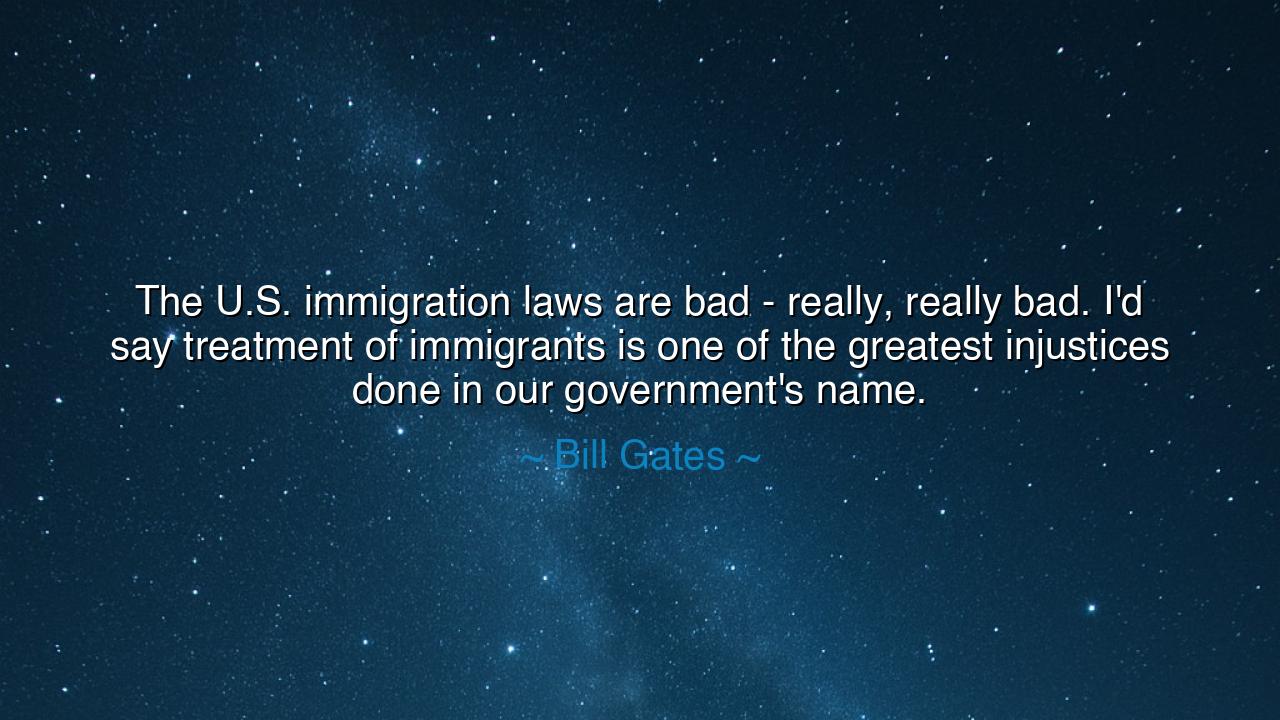
The U.S. immigration laws are bad - really, really bad. I'd say
The U.S. immigration laws are bad - really, really bad. I'd say treatment of immigrants is one of the greatest injustices done in our government's name.






"The U.S. immigration laws are bad — really, really bad. I'd say treatment of immigrants is one of the greatest injustices done in our government's name." Thus spoke Bill Gates, a man whose vision helped shape the modern age, yet whose words here turn not toward technology, but toward humanity itself. In this declaration, he lays bare a truth that has too long been shrouded in silence: that the greatness of a nation is not measured by its wealth or inventions, but by its compassion toward the stranger, the immigrant, the one who seeks only a chance to live and labor in dignity. Gates’s words are both a lament and a rebuke — a call to remember that laws, when stripped of mercy, can become instruments of injustice rather than guardians of order.
From the earliest days of the Republic, immigration has been the lifeblood of America’s promise. Men and women crossed oceans not to conquer, but to build — to flee famine, tyranny, and despair in the hope of freedom. It was through their hands that the nation’s cities rose, its railways stretched, and its dreams took flight. Yet, as Gates observes, the laws meant to guide this sacred passage have grown twisted and cruel, ensnaring those who come in hope and leaving them to suffer in confusion, poverty, or fear. What was once a gateway of opportunity has, in many ways, become a wall of exclusion.
Gates, though known as a builder of machines, speaks here as a builder of understanding. He has seen firsthand the power of minds born beyond America’s shores — innovators, scientists, and workers whose talents have advanced medicine, technology, and progress itself. And yet, he saw them hindered by bureaucracy and prejudice, by systems that value paperwork over potential. His cry of frustration — that immigration laws are “really, really bad” — is not the anger of a politician, but the sorrow of a humanist who sees opportunity dying at the hands of rigidity. To him, and to all who see the truth, these laws are not merely inefficient — they are a moral wound, an offense against the very ideals upon which the nation was founded.
History gives us many mirrors to reflect this truth. Recall the tale of the Chinese Exclusion Act of 1882, when fear and greed conspired to bar an entire people from contributing to the land they had helped to build. Chinese immigrants had labored on the railroads that united the continent, yet were denied citizenship and subjected to violence. The law declared them unworthy — not because of their deeds, but because of their origin. Such acts, wrapped in the language of legality, reveal how injustice can wear the mask of law, and how nations, in defending their boundaries, sometimes wound their own souls.
Gates’s words pierce the same ancient tension — the battle between law and humanity, between what is written and what is right. He reminds us that governments, though born to preserve justice, can commit grave wrongs when they forget the faces of those they govern. The immigrant, in his view, is not a threat but a gift: a bearer of courage, a vessel of hope, a living reminder of the ideals America claims to hold dear. When such people are treated with cruelty — detained, dismissed, or denied — it is not merely they who suffer, but the nation itself, for it betrays its own covenant with freedom.
Yet his message is not despair, but awakening. If injustice can be done in the government’s name, it can also be undone in the people’s name. The duty falls not on leaders alone, but on every citizen who values fairness and truth. We must see in every immigrant the reflection of our ancestors — for there was a time when each of our forebears, too, was a stranger on these shores. To reform the laws is not merely an act of policy, but an act of moral renewal — a recognition that humanity cannot be divided by borders and bureaucracy.
The lesson, then, is both simple and eternal: compassion is the truest measure of civilization. No nation can call itself free while it builds prisons for the hopeful, nor righteous while it condemns the weary for seeking refuge. Let those who hold power remember that their laws are only just when they uplift the human spirit. Let every citizen speak, act, and vote in defense of the voiceless, for silence in the face of injustice is itself a form of betrayal.
So remember the wisdom of Bill Gates: that the treatment of immigrants reveals the soul of a nation. The future will judge not our wealth, but our mercy; not our borders, but our hearts. Therefore, let each generation strive to make the law serve compassion, and to ensure that no dreamer who knocks upon the door of freedom is turned away by indifference. For only when the stranger is welcomed, and the law is guided by justice, will the promise of America — and of humanity — be truly fulfilled.






AAdministratorAdministrator
Welcome, honored guests. Please leave a comment, we will respond soon